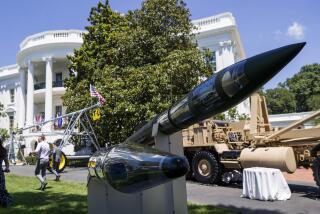U.S. may delay use of missile shield
- Share via
WASHINGTON — In a bid to win Russian support for a controversial U.S. missile defense system in Eastern Europe, the United States has proposed delaying its activation until there is concrete intelligence that Iran has long-range missiles, Defense Secretary Robert M. Gates said Tuesday.
Gates made the offer directly to senior Russian officials during a visit to Moscow last week, but chose to publicize it on the same day President Bush highlighted the threat of Iran’s missile program, which the president said may enable Tehran to strike the U.S. mainland by 2015.
The Eastern European system faces strong objections from Moscow, which fears it could also be used against Russia’s nuclear missiles, and from the Democratic-led Congress, which has cut funding for the program’s construction. Voters in Poland and the Czech Republic, where the system is to be based, are also overwhelmingly opposed.
Bush said Tuesday that Iran tested ballistic missiles just less than a year ago that were capable of reaching Israel, Turkey and U.S. troops in the Persian Gulf. Iranian officials, he added, have said they are developing missiles with a 1,200-mile range, which would allow Tehran to strike North Atlantic Treaty Organization allies in Eastern and Southern Europe, and U.S. intelligence assessments indicate that Iran could deploy a longer-range intercontinental ballistic missile by 2015.
“Today we have no way to defend Europe against the emerging Iranian threat, and so we must deploy a missile defense system there that can,” Bush said in a speech at the National Defense University, a school for senior military officers in Washington.
Under current plans, construction would begin on the system next year and it would be activated by 2013, just ahead of the projected completion of the Iranian program. “The need for missile defense in Europe is real and I believe it’s urgent,” Bush said.
Although the intelligence estimate that Iran could have an ICBM by 2015 has been public for several months, the two messages -- Bush’s warning on the Iranian threat and Gates’ on the U.S. willingness to placate Russian fears -- suggested a level of urgency had entered the administration’s calculations.
U.S. officials familiar with the offer to the Russians said it would not give Moscow a veto over the system’s deployment and that American officials would continue negotiations with Poland and the Czech Republic, despite Russia’s insistence that those talks cease.
But according to one senior U.S. official involved in the talks with the Russians, the U.S. would “reconsider the timeline” for construction if Iran’s schedule falls behind current intelligence estimates, including the possibility of a delay in switching on the system until the ICBM threat becomes more concrete.
“They had said in some of our discussions: ‘We know it’s directed against us, because even if the Iranians immediately did everything you wanted, you would still build it,’ ” the administration official said. “And we said: ‘Actually, there are other threats that may emerge, but the urgency and the timeline is based on our sense of what Iran is doing.’ ”
Gates, traveling Tuesday in the Czech Republic, said the plan was still in the conceptual phase and that no details had been presented to the Russian government.
“The idea was we would go forward with the [Polish and Czech] negotiations, we would complete the negotiations, we would develop the sites, build the sites, but perhaps would delay activating them until there was concrete proof of the threat from Iran,” Gates said in Prague, the Czech capital.
In public, Russian President Vladimir V. Putin has remained implacable, and the Bush administration now faces another hurdle with the weekend victory of the opposition Civic Platform party in Polish parliamentary elections.
The Polish and Czech parliaments must approve the U.S. system, and Civic Platform has expressed more skepticism about it than the outgoing Law and Justice Party, arguing during the campaign that the government had not demanded enough from the U.S. in return for allowing it to base 10 interceptor missiles on Polish soil.
james.gerstenzang@latimes.com.
More to Read
Sign up for Essential California
The most important California stories and recommendations in your inbox every morning.
You may occasionally receive promotional content from the Los Angeles Times.













